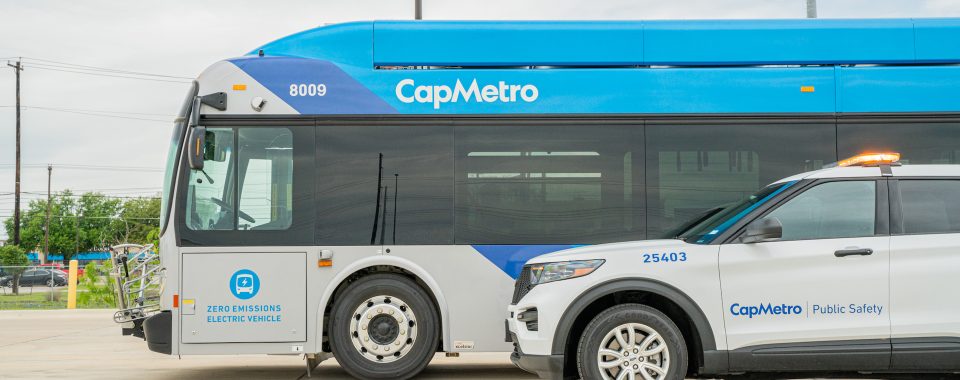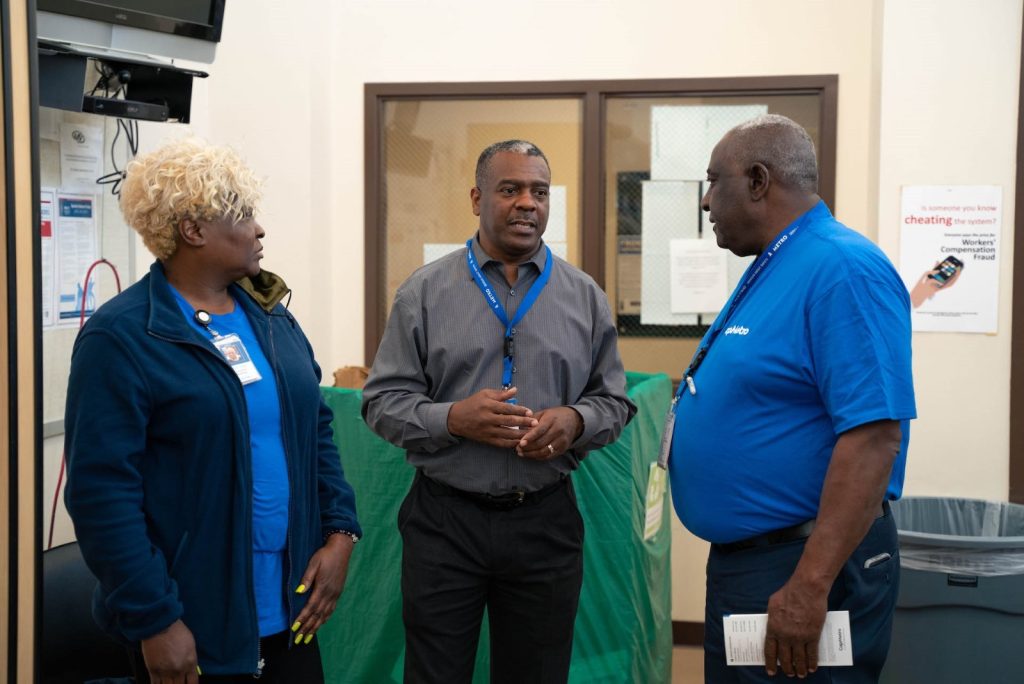
It’s almost unimaginable that from 1980 to now, Central Texas would grow to the size it has, but here we are. Over the last 38 years, CapMetro has expanded in many ways to keep up with that growth.
Since its inception in 1985, CapMetro has grown to provide more than 70,000 daily trips, on average, and we expect that number to grow even more in the future. That’s a lot of customers! It is also part of the reason why the agency decided to create a comprehensive public safety program to ensure a safe and reliable trip on board, as well as while you wait at a transit stop.
We surveyed our customers and frontline staff in Spring 2021 to learn what we could be doing better to make them feel safer on our system. From that survey, the agency shifted away from the structure already in place to address safety to create a three-pronged comprehensive approach, which essentially consists of three separate safety teams to have an effective response when our customers or frontline team needs it: Public Safety Ambassadors, Community Intervention Specialists, and a Transit Police department.
“Prior to this program, we had a security system in place, but as we continued to grow as a region, we realized that we needed to take a more comprehensive approach,” said Gardner Tabon, CapMetro’s Executive Vice President, Systemwide Accessibility & Chief Safety Officer. “We wanted to be a part of the solution, so we created three separate teams with three different purposes to seek the needs of our customers and staff.”

While those teams each require a different set of skills, they all work together to ensure our frontline staff and our customers get the correct help they need when they need it.
Here’s a quick breakdown of each team.
Public Safety Ambassadors:

This was the first team to come together for the Public Safety Program. Currently, there are 25 ambassadors, as well as one manager and three supervisors. The ambassadors are all unarmed with a background in customer service, law enforcement or security backgrounds. They’re all highly trained with the skills and knowledge to respond swiftly to immediate safety concerns and connect riders with the appropriate resources.
“One reoccurring point in the Spring 2021 survey was that our customers and frontline staff wanted a greater presence of uniformed personnel that weren’t necessarily armed, which is why we created our Public Safety Ambassador program. They serve as our eyes and ears on the system,” said Tabon.
In many cases, our ambassadors ride the service to provide a visible presence and help give out information when needed, similar to a frontline customer service ambassador. However, they also will respond to safety concerns like welfare checks, suspicious activity, or vandalism. With their knowledge and training, they can decide the appropriate response, including connecting customers to our Community Intervention Specialists.
Community Intervention Specialists:

This team consists of three individuals, all trained social workers, who step in to help individuals when they require specialized assistance, including those who are housing insecure or experiencing homelessness.
“Our community intervention specialists are vital to making this approach work,” said Tabon. “They have deep connections with local organizations that provide assistance to those who use our system, or for individuals who frequent our transit stops and stations.”
The agency’s community intervention specialists will respond to calls they’ve received from Public Safety Ambassadors, customers, or situations they’ve seen firsthand across our transportation network. From there, if the individual is willing, they will work to give them specialized resources for their situation, including support for housing, mental health, and substance abuse.
From October 2023, they’ve engaged more than 1,700 individuals, referred more than 300, and connected approximately 2 dozen into housing.
In addition, they also train our internal staff in Mental Health First Aid.
“Instead of having them explain what they do, they are able to train our frontline team with tools to de-escalate a scenario, read an issue and respond from an informed perspective. Our Community Intervention Specialists cannot be everywhere all at once, so this added layer of internal training helps us further our comprehensive approach,” said Tabon.
Transit Police:

This is the third and final piece of the 3-pronged approach that the CapMetro Board of Directors approved in August 2021. While the agency is still waiting for Texas Commission on Law Enforcement, or TCOLE, certification, which is needed to legally create a police department, CapMetro has already selected a chief and laid the foundations of the department, with the help of the community.
“Our desire with creating a Police Department is to create relationships with our daily customers, and first-time users, to use us as a resource. We will be ready to enforce the law, when necessary, but we want our team to develop relationships to also get ahead of and resolve issues before they escalate,” said Tabon. “Transit Police is something new for our region, but it’s necessary to have a developed department that is solely dedicated to our system and can respond in a timely manner when needed.”
Previously, CapMetro contracted to Austin Police Department to dedicate officers to its transit network. Now, the agency will have dedicated employees around the clock.
These officers will respond when situations truly require law enforcement. They will be trained in crisis intervention, people-centric policing, as well as fair and impartial policing.
“The bottom line is that this somewhat new approach with three specialized teams is designed to address each safety incident effectively with the right resources,” said Tabon. “Not every safety incident can be addressed the same, but with these three teams, we can build toward a safer transit experience for our customers and our frontline team.”
As we continue to create our own Transit Police Department, we also know it’s equally important to engage with our community as we do it. From now until April 25, you can provide feedback on our third round of policies for the department.
The agency is expecting TCOLE certification in the summer of 2024, and to hire its first officers in 2025.
In the coming weeks, our goal is to help our customers, staff and our community learn more about each team, its function, and how it connects to the greater 3-team approach. We’re taking an in-depth look at each team to understand the need for this program, and how it works to help you have a safer and smoother ride on board our services. We hope you’ll follow along.



